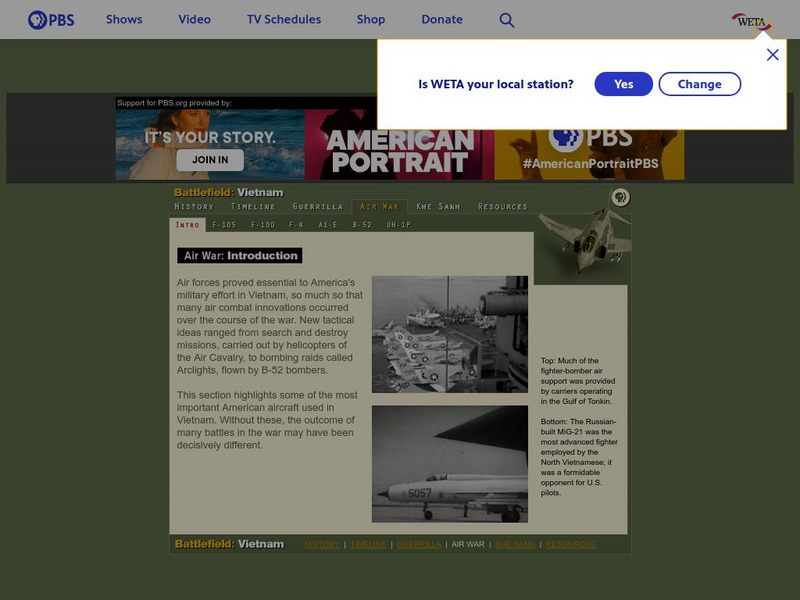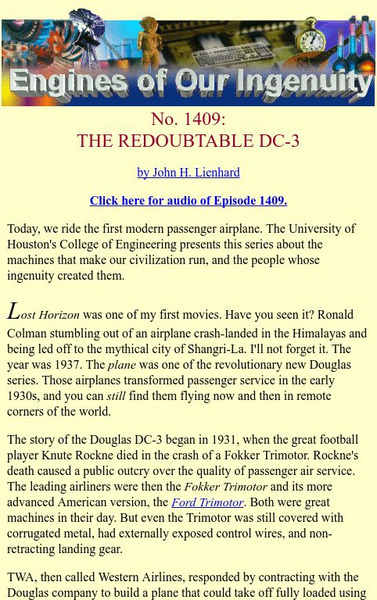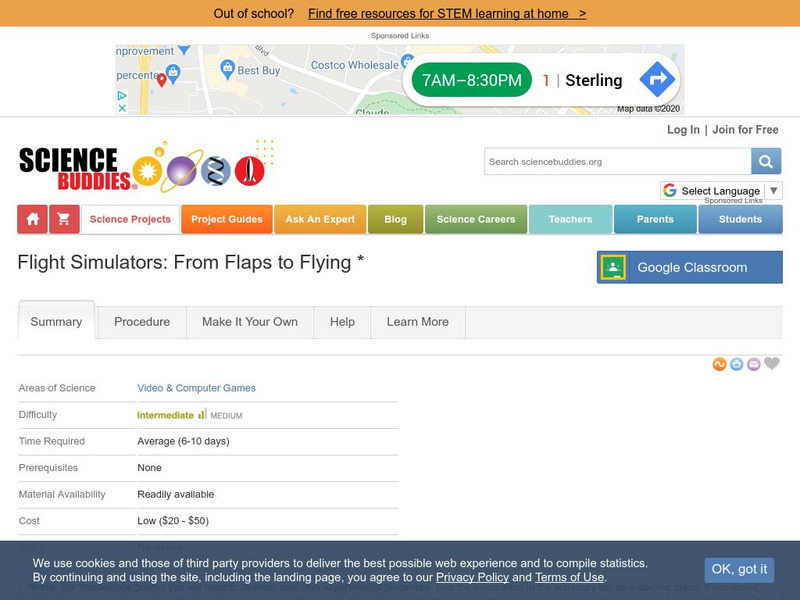TeachEngineering
Teach Engineering: Let's Get It There Fast
The purpose of this activity is to demonstrate how aircraft have decreased the amount of time it takes to transport people and cargo. Students will compute the time it takes to travel between two cities for several modes of...
Exploratorium
Exploratorium: Hoopster
Students create their own airplane using straws and other materials and learn the principles of aerodynamics.
The Franklin Institute
Franklin Institute: Flights of Inspiration
Franklin Institute site showcases the first flight taken by the Wright brothers. Follows the Wright brothers plan to achieve first flight as they used their failures to win them success in aviation.
TeachEngineering
Teach Engineering: May the Force Be With You: Lift
Students revisit Bernoulli's Principle (Lesson 1 of the Airplanes unit) and learn how engineers use this principle to design airplane wings. Airplane wings create lift by changing the pressure of the air around it. This is the first of...
TeachEngineering
Teach Engineering: Windy Tunnel
The purpose of this activity is to demonstrate Bernoulli's Principle as it relates to winged flight. The students will use computers to see the influence of camber and airfoil angle of attack on the lift.
PBS
Pbs: Battlefield Vietnam: Air War
This PBS Battlefield Vietnam site describes the airplanes used by the U.S. to carry out the air war in Vietnam.
University of Houston
University of Houston: Engines of Our Ingenuity: No. 1409: The Redoubtable Dc 3
Read about the success of the DC-3 passenger plane, which went into use in 1936, in overcoming the difficulties such planes had encountered up until then. This is a transcript of a radio broadcast.
BBC
Bbc Newsround: Flight Gadget Rules to Be Relaxed
Article reports on new rules in Europe relaxing restrictions on the use of electronic devices during air travel.
Smithsonian Institution
National Museum of American History: Where's Everyone Going?
A great resource from the National Museum of American History that shows various modes and uses of transportation in the 19th and 20th centuries.
TeachEngineering
Teach Engineering: Adaptations for Aeronautical Engineering
This activity first asks the students to study the patterns of bird flight and understand that four main forces affect the flight abilities of a bird. They will study the shape, feather structure, and resulting differences in the pattern...
Government of Alberta
Learn Alberta: Math Interactives: Exploring Trigonometry (Video Interactive)
This multimedia Learn Alberta math resource looks at how trigonometry is used in making sure that airplanes land safely at airports. The accompanying interactive component gives students practice in using trigonometric ratios, namely...
Other
Ontario Council for Technology Education: Transportation Design and Construction [Pdf]
In this project, students will develop knowledge and skills related to the construction of vehicle/craft systems. They will identify and describe the major systems and components of vehicles, aircraft, and/or watercraft such as body,...
Science Buddies
Science Buddies: Flight Simulators: From Flaps to Flying
Before pilots ever step behind the controls of a real jet they've already logged thousands of virtual air miles. It might not qualify you to fly a real jumbo jet, but you too, can learn the logistics of aviation by experimenting with the...
A&E Television
History.com: 9/11: How Air Traffic Controllers Managed the Crisis in the Skies
September 11, 2001 was not a great day in air traffic control. As the morning progressed, four separate terror attacks unfolded in the skies, with hijackers using commercial aircraft as weapons. Perpetrators deliberately flew three of...
Science and Mathematics Initiative for Learning Enhancement (SMILE)
Smile: Lab Work: Come Fly With Me
This site by the Illinois Institute of Technology lets students use a vacuum cleaner hose, ping pong balls, straws and other materials to investigate the effect of moving air upon the surfaces which it hits. Principles are applied as...
Alabama Learning Exchange
Alex: Let's Calculate Flight!
Students will use stop watches to help understand elapsed time when they fly paper airplanes through the air. Students will then move on to using clocks. Students will work out elapsed time word problems using made up flight schedules.
Council for Economic Education
Econ Ed Link: Transportation: They Say We Had a Revolution (Part 1)
Advancements in transportation have played a key role in the growth of our nation. U.S.government policies have also had a considerable impact on the development of transport as we know it today. For this series of three lessons, the...
Council for Economic Education
Econ Ed Link: Transportation: They Say We Had a Revolution (Part 3)
Advancements in transportation have played a key role in the growth of our nation. U.S. government policies have also had a considerable impact on the development of transport as we know it today. In this series of three lessons, the...
TryEngineering
Try Engineering: Engineered Sports
Students work in teams to investigate how aerospace engineering relates to sports, especially golf ball design and the physics of bounce. They use this information to determine whether these aerospace principles can be applied to...
TED Talks
Ted: Ted Ed: Rhenium: Periodic Table of Videos
The team at Periodicvideos has created a TED-Ed Lesson for every element of the periodic table. This video will be about rhenium, an extremely expensive metal, often used in aircraft engines. [7:37]
PBS
Pbs: Who Made America?: Innovators: Elmer Sperry
A prolific inventor and businessman, Sperry engineered a gyrocompass that made piloting ships, airplanes, and even spacecraft more reliable. He formed eight different companies to produce his inventions, some still in use today.
TeachEngineering
Teach Engineering: Balsa Glider Competition
The purpose of this activity is to bring together the students' knowledge of engineering and airplanes and the creation of a glider model to determine how each modification affects the flight. The students will use a design procedure...
Grammarly
Grammarly Blog: Italics and Underlining: Names Ships and Trains
An explanation and examples using italics/underlining when writing the names of spacecraft, aircraft, ships, and trains.
Other
Transit People: Early Transportation
Today we use cars, trains, airplanes and boats to travel around our world. But it hasn't always been this easy. Learn about the many different ways people have traveled in the past.




















